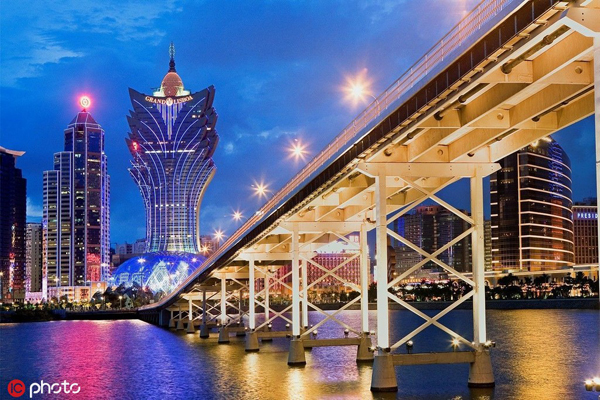Macao Special Administrative Region


Major social and economic indicators (2018)
Area: 32.9 sq km
Population: 663,400
Nominal gross domestic product (GDP): 440.3 billion Macao patacas ($54.54 billion)
Nominal GDP per capita: 666,893 patacas
Value of total merchandise trade: 102.29 billion patacas
Value of export: 12.19 billion patacas
Value of import: 90.1 billion patacas
Industrial structure (% of GDP) (2017):
Primary industry (agriculture, forestry, animal husbandry, fishery): Not applicable
Secondary Industry (industrial and construction): 5.1% of GDP
Tertiary industry (service industry): 94.9% of GDP
Port container throughput: 138,639 TEUs
Passenger throughput:
Visitors received: 35.8 million passenger trips
Macao International Airport: 8.26 million passenger trips
Note: the above figures are provided by the relevant government departments of Macao Special Administrative Region.
Industries
Macao is a free port with no tariffs on general imports, and thus occupies an important position in the regional economy and is a bridge connecting the Chinese mainland and international markets.
It has four pillar industries: manufacturing, tourism and gambling, finance, and construction and real estate.
Since 2001, Macao has been laying stress on its tourism and gambling industries to boost its economic growth while also developing its service sector.
With the major goal of establishing an international tourism and leisure hub and building a service platform for economic and trade cooperation between China and Portuguese-speaking countries, tourism in Macao has grown steadily over the past decades.
In 2017, 32.6 million visitors traveled to Macao, a 5.4 percent year-on-year increase. Annual earnings from Macao's gambling industry were strong at 265.7 billion patacas during the same period, according to research by the University of Macau.
Macao's financial industry has seen rapid development since the late 1980s. After more than 30 years of development, Macao has built a modern and open financial system with its own characteristics. By the end of 2017, the number of banking institutions permitted to operate in Macao totaled 29, including nine Macao-registered banks and 20 branches of nonlocal registered banks.
The real estate industry in Macao continued to flourish in 2017. The overall volume of transactions rose by 15 percent over the previous year to 85.2 billion patacas, accounting for 21.1 percent of GDP.
With the transformation of the global manufacturing supply chain and regional differences in production costs, Macao's economic development has shifted to the service sector since the 1990s. Manufacturing's share of GDP has decreased from 20.6 percent in 1989 to 0.6 percent in 2015.
Transport
Macao is one of the main transport hubs in Asia. Macao International Airport, which was started operations in November 1995, is the world’s second and China's first airport to be built on land reclaimed from the sea.
The airport has regular flights to 56 domestic and international cities, including Beijing, Shanghai, Bangkok and Chiang Mai in Thailand, Kuala Lumpur in Malaysia, Taipei and Kaohsiung in Taiwan, and Singapore.
There are three passenger terminals in Macao – Outer Harbor Ferry Terminal, Inner Harbor Ferry Terminal, and Taipa Island Passenger Terminal – providing cross-boundary ferry services and transporting passengers between Macao and Hong Kong, and between Macao and the Chinese mainland.
The Hong Kong-Zhuhai-Macao Bridge, the world's longest cross-sea bridge, starting its construction in December 2009, was formally opened on Oct 24, 2018. It links the three different customs areas of Macao, Hong Kong and Zhuhai in Guangdong province, and connects the eastern and western sides of the Pearl River estuary.
Construction of the light rail transit (LRT) system is underway in Macao and expected to be completed in December 2020. The section on Taipa Island is set to be 9.3 km long with 11 stations.
After completion, the LRT system will be connected to the Guangzhou-Zhuhai Intercity Railway and thus join the national rail network. It will take only one hour to travel from Macao to Guangzhou in Guangdong province.
Role in the Greater Bay Area
According to the development plan of the Guangdong-Hong Kong-Macao Greater Bay Area, Macao is positioned as one of the area's four core cities. It is expected to: build a world tourism and leisure center and a service platform for economic and trade cooperation between China and Portuguese-speaking countries; promote diversification of the economy; and build an exchange and cooperation base with Chinese culture as the mainstream and diverse cultures coexisting.
Key words for Macao in the Greater Bay Area
Entrepreneurship and employment:
Develop into an exchange center for innovation and entrepreneurship for youth from China and Portuguese-speaking countries.
International financial hub:
Support Macao in developing a China-Portuguese-speaking countries financial services platform, establishing an export credit insurance system, developing as an RMB clearing center for Portuguese-speaking countries, leveraging Macao's strengths as the headquarters of the China Portuguese-speaking Countries Cooperation and Development Fund, and taking up financial cooperation services between China and those countries.
Study and explore the development of a Macao-Zhuhai cross-boundary financial cooperation demonstration zone.
Modern services industry:
Support Macao in developing special financial products and services such as leasing, explore Macao's development taking account of complementarity with nearby regions, and study the feasibility of establishing in Macao a securities market denominated and cleared in RMB, a green finance platform and financial service platform between China and Portuguese-speaking countries.
Support the efforts of Macao in expediting the development of a food trading and distribution hub for Portuguese-speaking countries.
MOST POPULAR
- 1 China Daily's 'Shopping in China' platform appeals to intl audiences
- 2 China updates Catalogue of Encouraged Industries for Foreign Investment
- 3 Policies concerning expats, foreign enterprises in December 2025
- 4 China becomes the world's fourth manufacturing power
- 5 China ascends global higher education ranking







